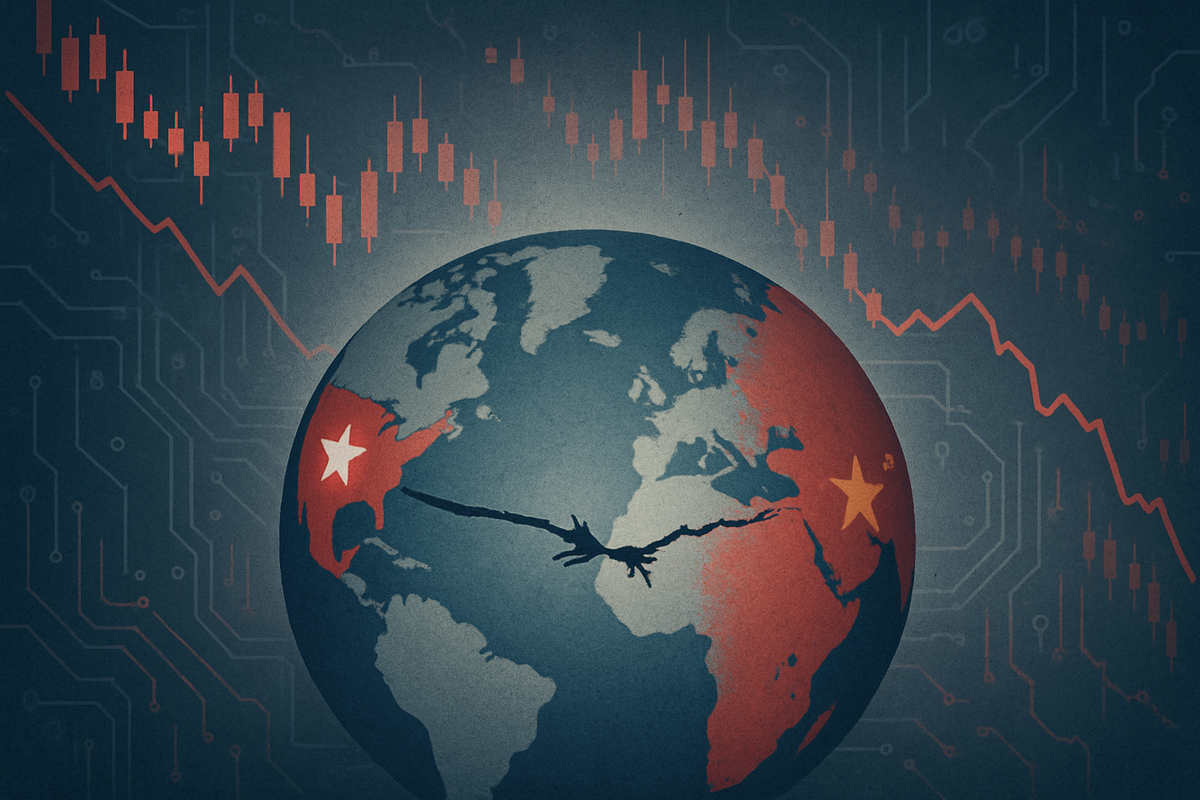
October 10, 2025 – Global financial markets experienced a significant downturn today, with a broad sell-off sweeping across indices, primarily fueled by escalating US-China tariff threats. Amidst this turbulent environment, technology giant Meta Platforms (NASDAQ: META) found itself under considerable pressure, with its stock reflecting the widespread investor apprehension. The renewed trade tensions have cast a long shadow over the tech sector, prompting concerns about supply chain disruptions, increased operational costs, and a potential slowdown in global economic growth.
The immediate implications of these tariff threats are a surge in market volatility and a pronounced shift towards risk-off sentiment. Investors are rapidly re-evaluating their positions, particularly in growth-oriented sectors like technology, which are often sensitive to geopolitical instability and economic headwinds. Meta Platforms, a bellwether for the digital advertising and emerging technology markets, saw its shares decline as the broader market reacted negatively to the prospect of a deepening trade dispute between the world's two largest economies.
Escalating Trade Tensions Rattle Global Markets
Today's market jitters stem from a fresh round of rhetoric and proposed punitive measures between the United States and China. While specific details of the latest tariff proposals are still emerging, the overarching theme points to an expansion of duties on a wider range of goods, particularly those critical to the technology supply chain. This escalation follows a period of uneasy calm, with previous trade agreements failing to fully resolve underlying economic and strategic disagreements. The timeline leading up to this moment has been characterized by intermittent negotiations, occasional breakthroughs, and recurrent breakdowns, creating an environment of perpetual uncertainty for multinational corporations.
Key players involved are, of course, the US and Chinese governments, whose policy decisions directly dictate the trade landscape. However, multinational corporations, particularly those with extensive manufacturing or consumer bases in both countries, are significant stakeholders, often caught in the crossfire. Initial market reactions have been overwhelmingly negative, with major indices like the S&P 500 and Nasdaq Composite experiencing sharp declines. Analysts are pointing to the potential for increased input costs, reduced access to key markets, and a general dampening of consumer and business confidence as primary drivers of the sell-off. The fear is that these tariffs could lead to higher inflation, slower economic growth, and ultimately, a reduction in corporate earnings across various sectors.
Meta Platforms and the VR Market: Caught in the Crosscurrents
Meta Platforms (NASDAQ: META) faces a multifaceted impact from the renewed US-China tariff threats. While primarily a software and advertising company, its significant investment in hardware, particularly through its Reality Labs division responsible for virtual reality (VR) and augmented reality (AR) devices like the Meta Quest, makes it vulnerable to supply chain disruptions. Many components and assembly operations for such sophisticated electronics are concentrated in Asia, particularly China. Increased tariffs on these components or finished goods could lead to higher production costs, which Meta might either absorb, impacting profitability, or pass on to consumers, potentially slowing adoption of its VR ecosystem.
Furthermore, a broader economic slowdown resulting from trade tensions could dampen advertising spending, Meta's primary revenue driver. Businesses, facing their own economic uncertainties, often cut marketing budgets first, directly affecting Meta's bottom line. The company's ambitious metaverse vision relies heavily on widespread adoption of its VR hardware and a robust digital economy, both of which could be hampered by a protracted trade war. While Meta's VR market position remains strong, with its Quest headsets dominating the consumer segment, the tariffs could complicate its efforts to expand market share and achieve profitability in this nascent sector. Other tech companies, particularly those heavily reliant on hardware manufacturing or with significant exposure to the Chinese consumer market, are also expected to feel the pinch, creating a ripple effect across the industry.
Wider Significance: A New Chapter in Geopolitical Economic Friction
The re-emergence of significant US-China tariff threats marks a critical juncture in broader industry trends, signaling a potential acceleration of supply chain de-risking and regionalization efforts. This event fits squarely into a decade-long narrative of increasing geopolitical economic friction, where national security concerns and economic competitiveness are increasingly intertwined. Companies across the tech spectrum, from semiconductor manufacturers to consumer electronics giants, have been exploring diversification strategies away from a concentrated reliance on China, but these new tariffs could significantly expedite that process.
Potential ripple effects on competitors and partners are substantial. Companies like Apple (NASDAQ: AAPL) and Microsoft (NASDAQ: MSFT), which also have extensive hardware manufacturing in Asia and significant market presence in China, face similar challenges. Partners in the VR/AR ecosystem, including component suppliers and content developers, could experience disruptions and reduced demand. Regulatory and policy implications are also profound, potentially leading to a further bifurcation of technological standards and ecosystems, often referred to as a "tech decoupling." Historically, similar trade disputes, while rarely leading to full-scale economic separation, have consistently resulted in increased costs, reduced innovation in affected sectors, and a shift in global manufacturing footprints. The current situation echoes earlier trade wars, but with an added layer of technological rivalry, making the stakes even higher.
What Comes Next: Strategic Shifts and Evolving Market Dynamics
In the short term, markets are likely to remain highly volatile as investors digest the full implications of the new tariff threats and await further clarity on policy. We can expect continued downward pressure on stocks, particularly in sectors with significant exposure to US-China trade. For Meta Platforms (NASDAQ: META) and its peers, the immediate challenge will be to reassure investors and articulate clear strategies for mitigating the impact of potential supply chain disruptions and reduced market access.
Longer-term, this event is likely to accelerate strategic pivots across the tech industry. Companies may intensify efforts to diversify their manufacturing bases, exploring options in Southeast Asia, India, Mexico, or even reshoring some production. This could lead to significant capital expenditures and operational shifts. Market opportunities may emerge for regions and countries that can offer stable and cost-effective alternatives to existing supply chains. Conversely, challenges will include increased production costs, potential delays in product launches, and the complexities of managing fractured global markets. Potential scenarios range from a rapid de-escalation of tensions, leading to a market rebound, to a prolonged trade conflict that fundamentally reshapes global manufacturing and trade relationships, forcing tech companies to operate in increasingly distinct regional ecosystems.
Comprehensive Wrap-Up: Navigating a Geopolitically Charged Future
Today's market sell-off, driven by renewed US-China tariff threats, serves as a stark reminder of the intricate link between geopolitics and financial markets. For Meta Platforms (NASDAQ: META), the event underscores the vulnerabilities inherent in its global supply chain for VR hardware and the sensitivity of its advertising revenue to broader economic sentiment. Key takeaways include the immediate negative impact on tech stocks, the acceleration of supply chain diversification efforts, and the deepening of economic nationalism.
Moving forward, the market will remain acutely sensitive to any developments in US-China relations. Investors should watch for official announcements regarding the scope and duration of tariffs, any retaliatory measures, and crucially, the responses and strategic adjustments from major tech companies. The lasting impact of this event could be a more fragmented global economy, where companies prioritize resilience and regional self-sufficiency over pure cost optimization. For investors, this environment necessitates a careful re-evaluation of portfolios, focusing on companies with robust balance sheets, diversified operations, and proven adaptability to evolving geopolitical landscapes. The future promises a more complex and geopolitically charged operating environment for global corporations.
This content is intended for informational purposes only and is not financial advice





